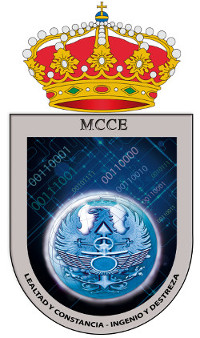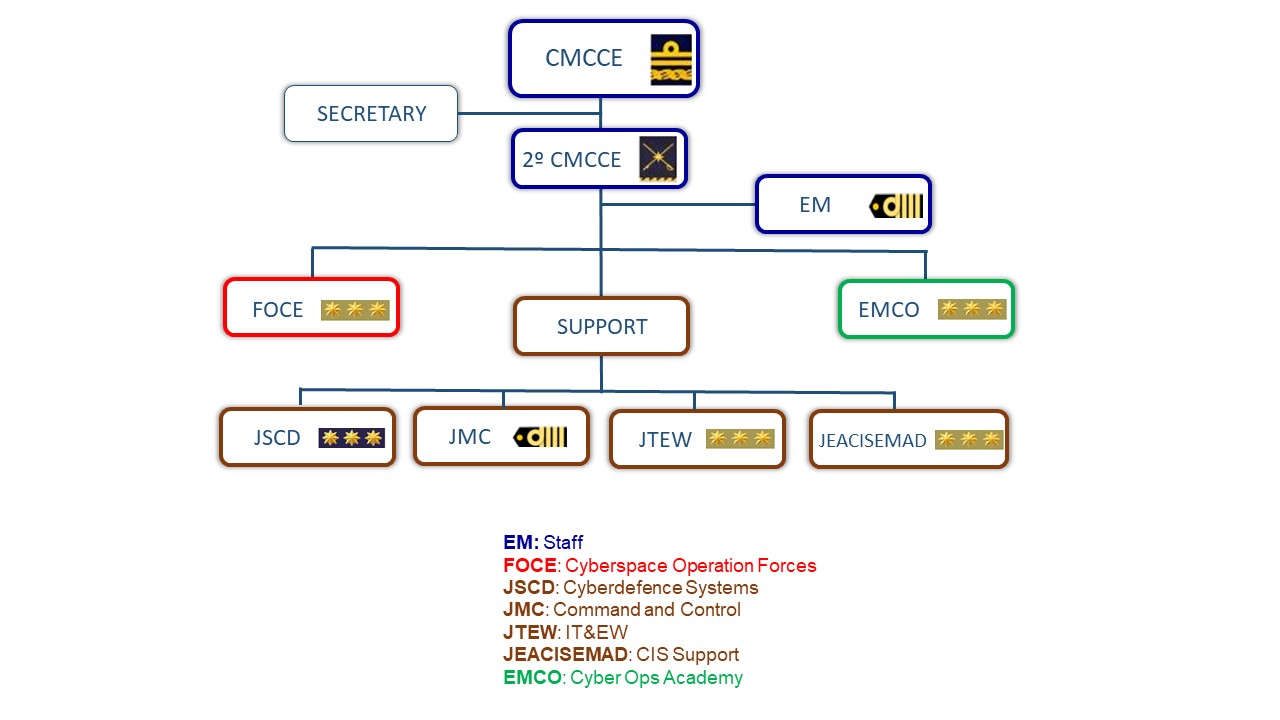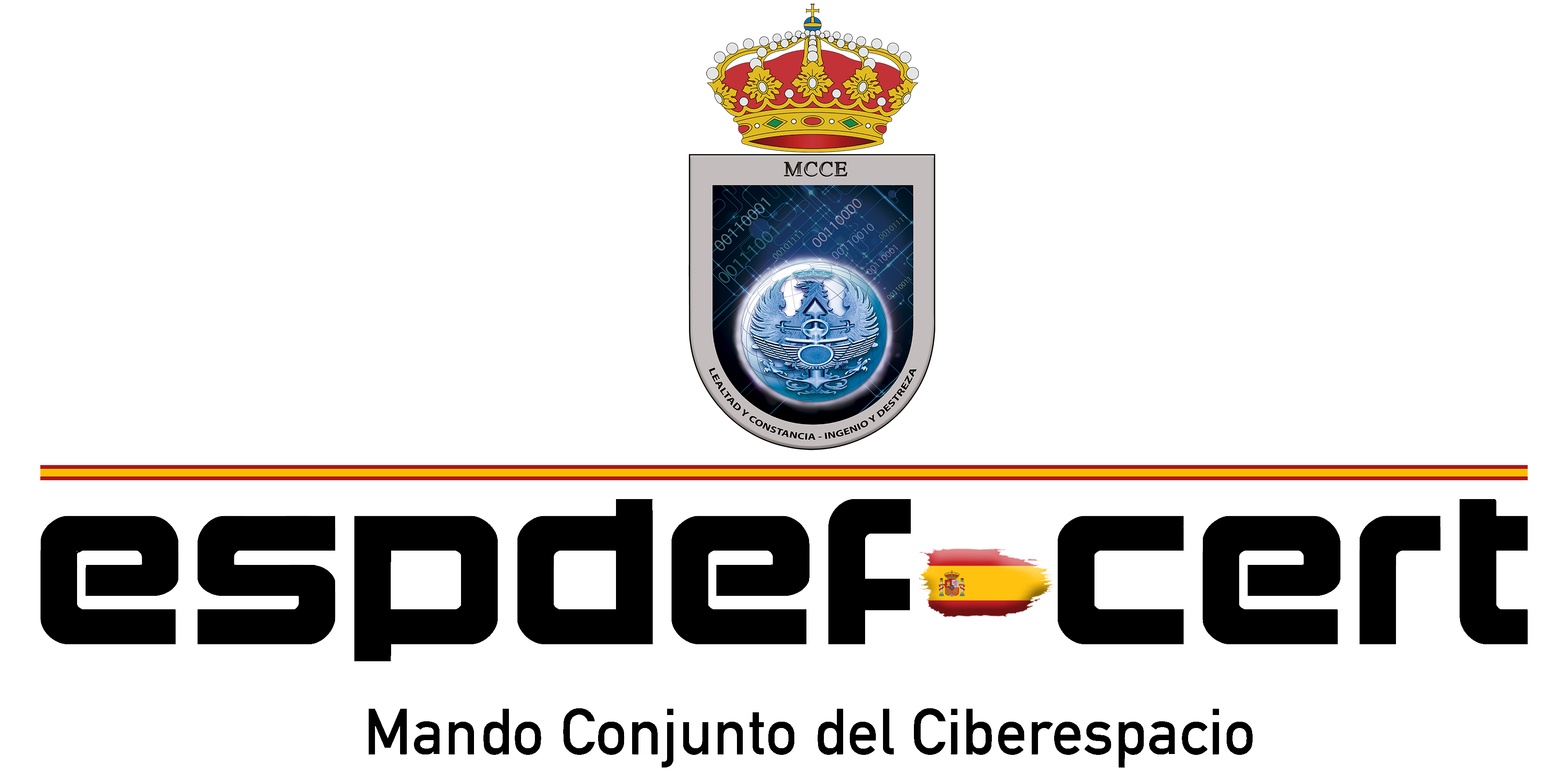
Joint Cyberspace Command (MCCE)

- The Joint Cyberspace Command (MCCE) will be the body responsible for planning, directing, coordinating, controlling and executing actions to ensure the SAF's freedom of action in cyberspace. To fulfil its mission, it will plan, direct, coordinate, control and execute military operations in cyberspace, in accordance with the operational plans in force. Within the scope of these operations, it will carry out the necessary actions to guarantee the survival of the physical, logical and virtual elements critical to defence and the Armed Forces. It shall also provide CIS support to the EMAD structure and shall be responsible for the encryption equipment and the crypto keys assigned to it.
- It will ensure the JEMAD's authority over the Integrated Defence Information Infrastructure (I3D) at the operational level, in line with the specific JEMAD-Secretary of State for Defence agreements, prioritising the provision of services to meet the operational needs of the Armed Forces. It will collaborate in the digital transformation of the Ministry of Defence, within the scope of the EMAD, in coordination and with the guidelines of the EMACON.
- It will advise the JEMAD in all matters concerning its area of responsibility and will represent the Armed Forces in the area of its competences before the OISD, in coordination with the organisations with responsibilities related to this area.
- It supports EMACON in capability planning in its area of responsibility. It will also be responsible, in collaboration with EMACON, for defining operational requirements, monitoring the procurement and sustainment of the means for Cyber Defence, joint Command and Control, Electronic Warfare, Navigation and Identification and Earth Observation Systems (in this case, also in collaboration with CIFAS), ensuring their interoperability and integration with those specific to the Armies and Navy and with those of the OISDs.
- The MCCE will include the Ministry of Defence's Computer Emergency Response Team, known as the Defence CERT (ESPDEF-CERT).
- It will be responsible for defining, directing and coordinating joint cyberspace awareness, education and training within its remit, working with the relevant authorities. It may also propose joint training needs. It will keep the JRRHH and the CESEDEN informed on educational matters.
- It will contribute with the resources of the MCCE to the JISR (Joint, Intelligence, Surveillance and Reconnaisance) process in collaboration with the MOPS and CIFAS, within the framework of the SAF Intelligence System and military operations.
- The MCCE will be responsible for managing the electromagnetic spectrum assigned to the SAF and for coordinating the orbit-electromagnetic spectrum resources of military satellites. It will carry out security audits of the Armed Forces' joint information and telecommunications networks and systems and others that the JEMAD may entrust to it.
- The Commander of the Joint Cyberspace Command (CMCCE), as the representative of the Ministry of Defence in the National Cybersecurity Council, will keep the JEMAD informed of what is discussed in this Council. It will maintain and promote cooperation with the National Security Department, the other national CERTs of reference (National Cybersecurity Institute and the National Cryptologic Centre) and organisations responsible for cybersecurity and cyberintelligence, both nationally and internationally, the latter in coordination with EMACON.
- The CMCCE will be responsible for the Information Security in Information Systems and Telecommunications Area (SEGINFOSIT) of the Ministry of Defence, in accordance with the powers granted to it by the Ministry of Defence Information Security regulations in force.
Biography

The Joint Cyberspace Command (MCCE) will be structured into:
- Command.
- Second Command.
- MCCE General Staff (EMMCCE).
- Cyberspace Task Force (FOCE).
- Military Cyber Operations School (EMCO).
- Command and Control Headquarters (JMC), with a FAS Tactical Data Links Management Centre (Torrejón de Ardoz).
- Cyber Defence Systems Headquarters (JSCD).
- Head of Telecommunications and Electronic Warfare (JTEW).
- Head of CIS Support to EMAD (JEACISEMAD).
The Joint Cyberspace Command Staff (EMMCCE) will be the main auxiliary body to the Commander of the MCCE, carrying out the planning, organisation, coordination, monitoring and control activities of the MCCE.
The EMMCCE will be structured as follows:
- Headquarters.
- Coordination Section (C-0).
- Staff (C-1).
- Intelligence (C-2).
- Operations (C-3).
- Logistics (C-4).
- Plans (C-5).
- CIS (C-6).
- Trainning (C-7).
- Resources and Finance (C-8).
- Cooperation and International Representation (C-9).
- The Cyberspace Operations Force (FOCE) will be responsible for the execution of military operations that ensure the SAF's freedom of action in cyberspace, in accordance with the operational plans in force. Within the scope of the aforementioned operations, it operationally and technically directs the activities of all the SAF's Cybersecurity Operations Centres (COCS). It coordinates with the Army, the Navy and the CESTIC the actions it deems necessary in the cyberspace field. When operations are being carried out in the electromagnetic spectrum, it will coordinate the execution of cyber actions concurrently with these.
- It will guarantee the confidentiality, integrity, availability and traceability of the information handled by the systems and networks used by the Armed Forces, as well as others entrusted to it by the JEMAD.
- It carries out activities enabling protection, detection and defence in the networks and critical services of the information and telecommunications systems used by the Armed Forces, as well as others entrusted to it by the JEMAD.
- It will carry out activities to obtain information, surveillance, reconnaissance and intelligence on cyberthreats and incidents in cyberspace, in coordination with the CIFAS and also with the MOPS in the area of military operations.
- It will also be responsible for guaranteeing the capacity to act in cyberspace and will carry out the responses decided upon in the event of threats or aggressions that may affect the National Defence, the systems and networks of the Ministry of Defence, or any others entrusted to it by the JEMAD.
The National Defence Directive 2012 establishes that deterrence is the result of having capabilities and the determination to use them if necessary. To this end, among other guidelines, it establishes that the Ministry of Defence participates in the promotion of comprehensive cybersecurity management, within the framework of the principles established for this purpose within the National Cybersecurity Strategy. This comprehensive management requires the Ministry of Defence to contribute to national cybersecurity, not limited to protect purely military systems. For this reason, and due to the critical nature of the information processed by information and telecommunications systems, their multiple dependence, technical complexity, quantity and geographical dispersion of their infrastructures, the creation of a Joint Cyber-Defence Command is required to direct and coordinate actions of the Armed Forces in this area.
The creation of the Joint Cyberspace Command (MCCE in Spanish) is the result of a gradual process in which six milestones are highlighted:
- January 28th, 2011, approval by the JEMAD of the " Military Cyber-Defence Vision". This vision guides the definition, development and use of the national military capabilities necessary to ensure the effective use of cyberspace in military operations.
- July 28th, 2011, approval by the JEMAD of the "Concept of Military Cyber -Defence". This concept establishes the principles, objectives and challenges of cyber-defence in the military field.
- July 12th, 2012, approval by the JEMAD of the "Action Plan for Obtaining Military Cyber- Defence Capability. This plan is configured as a living document to adapt to the dynamic nature of cyberspace and the evolution of information technologies and to seek synergy through the coordination of efforts between the joint field (EMAD), the corporate field (DIGENIN), and the specific fields (Armies), as well as by taking advantage of existing structures.
- February 19th,2013, the Minister of Defence issued "Ministerial Order 10/2013, creating the Joint Cyber-Defence Command".
- The DEF Order of 2015, dated 16 September, created the JCISFAS, heir to the CIS Division of the EMACON, and entrusted it with the responsibility of drawing up the requirements of the Information and Telecommunications Systems (CIS) of the operational structure of the Armed Forces, including Electronic Warfare Systems (EW) and Earth Observation Systems (EOS). It also monitored the activities related to the procurement and operation of these Information and Telecommunications Systems, including in the fields of Information Security and Cyber Defence, evaluating and supervising their operational effectiveness. It provided support to the operational structure of the Armed Forces in terms of CIS, EW and SOT resources, in accordance with the guidelines established and the specific agreements to this effect between the JEMAD and the Secretary of State for Defence. It advised the JEMAD on the CIS aspects of Military Command and Control relating to the functional unit. It was also the representative before the OISDs in the CIS aspects of the EMAD's area of responsibility and supported the JEMAD in the planning and strategic conduct of operations.
- 27 July 2020, Order DEF/710/2020 determines that the necessary freedom of action of the Armed Forces must be guaranteed in the cyberspace domain. To this end, the Joint Cyberspace Command has been created to reinforce the FAS's capacity to act in this area. This Command is established on the basis of the Joint Cyber Defence Command (MCCD) and the Information and Telecommunications Systems Headquarters (JCISFAS), which disappear from the new structure of the Defence Staff.

ESPDEF-CERT is the name of the Ministry of Defence Incident Response Centre. It is part of the Joint CyberDefence Command. Its scope of action includes the networks and the information and telecommunications systems of the Spanish Armed Forces, as well as those other networks and systems specifically entrusted to it that may affect the National Defence.
Contact (NOT TO REPORT INCIDENTS ):
e-mail espdef-cert@mde.es espdef.cert@gmail.com
Twiter @ESPDEF_CERT
Duty Phone. (only working hours):: +34 91 512 6289
PGP Fingerprint: F9F38723F50DA3810E725FF16EEC566F438D6BEE
Downloads
MCCE NEWSLETTERS
Newsletter 01/2022PDF - 1638.06 KB Newsletter 12/2021PDF - 816.36 KB Newsletter 11/2021PDF - 121.32 KB Newsletter 10/2021PDF - 1713.65 KB Newsletter 09/2021PDF - 1644.65 KB Newsletter 08/2021PDF - 1539.13 KB Newsletter 07/2021PDF - 1650.87 KB Newsletter 06/2021PDF - 1536.10 KB Newsletter 05/2021PDF - 1607.31 KB Newsletter 04/2021PDF - 1638.59 KB Newsletter 03/2021PDF - 1710.86 KB Newsletter 02/2021PDF - 1635.56 KB Newsletter 01/2021PDF - 1636.56 KB Newsletter 11/2020PDF - 1534.76 KB Newsletter 10/2020PDF - 1649.38 KB Newsletter 09/2020PDF - 1636.06 KB Newsletter 08/2020PDF - 1637.10 KB Newsletter 07/2020PDF - 1637.97 KB Newsletter 06/2020PDF - 510.47 KB Newsletter 05/2020PDF - 435.36 KB Newsletter 04/2020PDF - 613.35 KB BULLETIN 06 CYBERNEWS COVID-19PDF - 502.10 KB BULLETIN 05 CYBERNEWS COVID-19PDF - 501.75 KB BULLETIN 04 CYBERNEWS COVID-19PDF - 502.70 KB BULLETIN 03 CYBERNEWS COVID-19PDF - 599.29 KB BULLETIN 02 CYBERNEWS COVID-19PDF - 572.97 KB BULLETIN 01 CYBERNEWS COVID-19PDF - 604.25 KB BULLETIN 03/2020PDF - 522.44 KB BULLETIN 02/2020PDF - 623.87 KB BULLETIN 01/2020PDF - 698.11 KB BULLETIN 17/2019PDF - 725.73 KB BULLETIN 16/2019PDF - 616.53 KB BULLETIN 15/2019PDF - 693.58 KB BULLETIN 14/2019PDF - 687.52 KB BULLETIN 10/2019PDF - 616.04 KB BULLETIN 09/2019PDF - 613.95 KB BULLETIN 08/2019PDF - 694.01 KB BULLETIN 07/2019PDF - 691.02 KB BULLETIN 06/2019PDF - 626.85 KB BULLETIN 05/2019PDF - 628.54 KB BULLETIN 04/2019PDF - 544.92 KB BULLETIN 03/2019PDF - 620.41 KB BULLETIN 02/2019PDF - 618.81 KB BULLETIN 01/2019PDF - 540.96 KB


